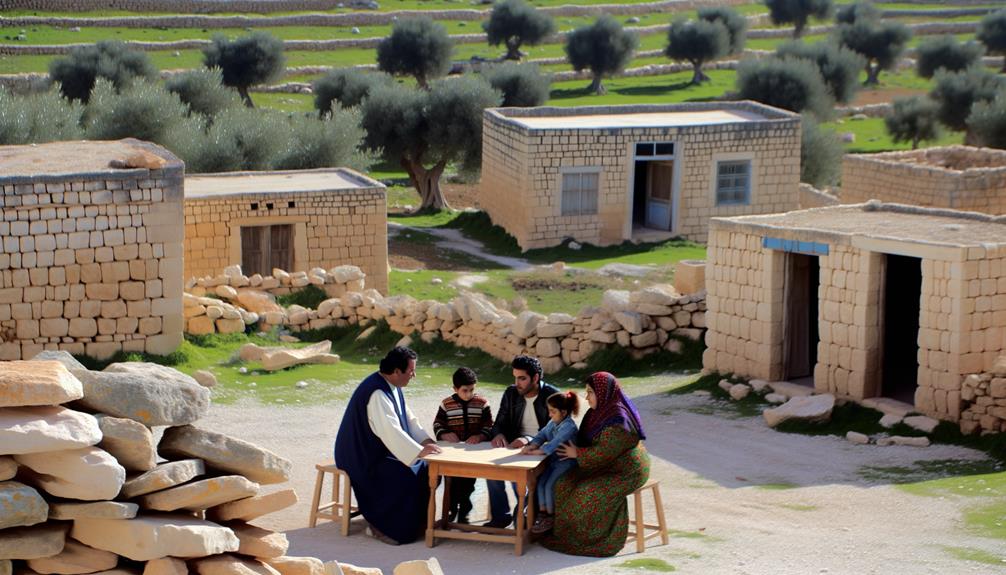Jabez Meaning In The Bible: Prayer, Pain, and Purpose
Jabez, a figure from the tribe of Judah mentioned in 1 Chronicles 4:9-10, has a name derived from the Hebrew word for ‘pain’ or ‘sorrow,’ reflecting his mother’s distress during childbirth. His brief yet powerful narrative depicts his fervent prayer to God, requesting blessings, expanded territory, and protection from harm.
The immediate divine response to his supplication underscores the significant theological theme of earnest prayer and divine benevolence. Jabez‘s honorable character amidst adversity serves as a profound example of faith’s transformative power and the potential for divine intervention in human lives.
Continue to explore his story for deeper insights into perseverance through faith.

Jabez Meaning in the Bible: Pain, Prayer, and God’s Blessing
| Aspect | Details |
|---|---|
| Name | Jabez (Hebrew: יַעְבֵּץ) |
| Meaning | “Sorrow” or “He makes sorrowful” |
| Biblical Reference | 1 Chronicles 4:9–10 |
| Key Story | Jabez prays to God for blessing and protection |
| God’s Response | God grants his request |
| Spiritual Significance | Turning pain into purpose through prayer and faith |
| Symbolism | Redemption, divine favor, power of prayer |
The Name ‘Jabez’

The name ‘Jabez,’ found in 1 Chronicles 4:9-10, holds significant theological and historical implications, reflecting both the cultural context of ancient Israel and the individual’s unique narrative within the biblical text.
Etymologically, ‘Jabez’ is derived from the Hebrew root meaning ‘pain’ or ‘sorrow,’ indicative of the circumstances surrounding his birth. This name, ascribed by his mother, underscores the prevalent practice in ancient Israel of naming children based on experiential realities or prophetic insights.
Historically, such nomenclature was not merely a label but a narrative encapsulating identity and destiny.
Theologically, Jabez’s plea to God for blessing and relief from his name’s connotations underscores a profound faith and transformative petition, exemplifying the power of prayer in altering one’s divinely-ordained path.
Biblical Context of Jabez

Understanding the broader biblical context of Jabez necessitates an examination of his brief yet impactful mention within the genealogical records of 1 Chronicles.
Nestled in Chapter 4, verses 9-10, Jabez emerges unexpectedly from the lineage of Judah, where he is distinguished by his prayerful plea to God. His invocation, renowned for its depth and fervor, petitions for divine blessing, enlargement of territory, guidance, and protection from harm.
This earnest supplication stands out amidst the otherwise routine genealogical listings, suggesting a significant spiritual fervor and favor. The chronicler’s deliberate inclusion of Jabez’s prayer highlights his unique faith and God’s affirmative response, thereby offering theological insights into divine-human interactions and the power of earnest prayer within the Judaic tradition.
Jabez’s Family Background

Born into the tribe of Judah, Jabez‘s family background is sparsely detailed in the scriptures, yet his placement within the genealogical records underscores his connection to a significant lineage in Israelite history.
As recorded in 1 Chronicles 4:9-10, Jabez is briefly mentioned within the extensive genealogies of Judah, highlighting his heritage. This inclusion signifies his connection to an illustrious tribe known for producing notable figures such as King David.
The chronicler’s decision to include Jabez, despite limited familial details, suggests an emphasis on his spiritual significance rather than his genealogical prominence. His mention amidst the descendants of Judah reflects a broader theological narrative within the text, emphasizing individual piety and divine favor over mere lineage.
Meaning of ‘Sorrow’ or ‘Pain’

In the context of 1 Chronicles 4:9-10, the name Jabez encapsulates the profound theological motif of ‘sorrow’ or ‘pain,’ reflecting his mother’s experience and shaping his narrative within the biblical text.
This etymological significance arises from his birth circumstances, as his mother declares, ‘I gave birth to him in pain.’ The Hebrew term for Jabez (יַעְבֵּץ) echoes themes of anguish and distress, anchoring his identity in a context of suffering.
This poignant origin story is not merely biographical but underscores a recurring biblical theme where personal names embody existential realities and divine purposes.
In Jabez’s case, his name serves as a constant reminder of human frailty and the potential for divine intervention amidst suffering.
Jabez’s Prayer to God

Jabez’s prayer to God, as recorded in 1 Chronicles 4:10, encapsulates an earnest petition for divine favor, emphasizing his desire for an enlarged territory and God’s hand upon him.
This supplication not only reflects his request for tangible blessings but also underscores a profound seeking of God’s protection from harm and evil.
The prayer’s theological significance lies in its demonstration of Jabez’s faith and reliance on divine providence, highlighting the broader biblical theme of God’s responsiveness to sincere prayers.
Jabez’s Earnest Petition
The heartfelt prayer of Jabez, found in 1 Chronicles 4:10, encapsulates a profound plea for divine blessing, protection, and expansion of territory, reflecting a deep reliance on God’s provision and favor.
In this solitary verse, Jabez petitions, ‘Oh that you would bless me indeed, and enlarge my territory, that Your hand would be with me, and that You would keep me from evil, that I may not cause pain.’
This prayer, nestled within the genealogical records of Judah, contrasts with the mundane listings, underscoring its significance.
Theologically, it demonstrates an earnest yearning for God’s active presence and safeguarding amid life’s uncertainties.
Historically, it reflects ancient Israel’s understanding of divine-human interaction, portraying God as an intimate provider and protector.
Divine Blessing Requested
Invoking a profound theological principle, Jabez’s prayer exemplifies an earnest appeal for divine favor, highlighting his belief in God’s capacity to bless and transform his circumstances.
Found in 1 Chronicles 4:10, Jabez’s supplication—’Oh that you would bless me indeed and enlarge my territory’—reflects a deep-rooted trust in Yahweh’s providence.
The historical context of Israel’s tribal expansion underscores Jabez’s request for material and spiritual enlargement as a means of fulfilling covenantal promises.
Scriptural analysis reveals that Jabez’s plea is not merely for personal gain but for a broader participation in God’s unfolding plan.
This prayer underscores a theological understanding that divine blessings are both transformative and instrumental in advancing God’s kingdom purpose on earth.
Seeking God’s Protection
As Jabez’s prayer continues, his fervent request for divine protection, ‘that Your hand would be with me, and that You would keep me from evil,’ underscores a theological awareness of the necessity for God’s safeguarding presence amidst life’s uncertainties.
This plea reflects the ancient Israelite understanding of God’s omnipotent hand as a source of guidance and shield against moral and physical perils.
Scripturally, the invocation mirrors the sentiments in Psalms, where God’s hand symbolizes deliverance and providence.
Historically, this prayer resonates with the existential realities of a people often besieged by external threats and internal moral struggles.
Jabez’s entreaty, consequently, is not merely personal but emblematic of a collective yearning for divine guardianship and moral fortitude.
God’s Response to Jabez

God’s response to Jabez’s earnest plea is both immediate and transformative, highlighting divine favor and mercy.
Scripture reveals that God granted Jabez’s requests by expanding his territory, thereby signifying a direct answer to his prayer for increased influence and blessings.
Additionally, Jabez received divine protection, underscoring the all-encompassing nature of God’s benevolence towards those who sincerely seek Him.
God’s Immediate Blessing
The divine response to Jabez’s prayer, as documented in 1 Chronicles 4:10, highlights the immediacy and generosity of God’s blessing, signifying His readiness to grant favor to those who earnestly seek His intervention.
This narrative underscores several theological and historical elements:
- Immediate Answer: God promptly responded to Jabez’s plea, demonstrating His attentiveness to heartfelt prayers.
- Generous Blessing: The blessings granted were abundant, showcasing God’s boundless grace.
- Faith Rewarded: Jabez’s unwavering faith was met with divine favor, illustrating the importance of trust in God.
- Historical Context: This event emphasizes the belief in ancient Israel that God actively participates in the lives of His people, willing to alter their circumstances favorably.
Thus, Jabez’s experience serves as an illustration of the efficacy of sincere prayer.
Expanded Territory Granted
Jabez’s prayer for an expanded territory, as recorded in 1 Chronicles 4:10, signifies a profound request for increased influence and responsibility, reflecting both his ambition and reliance on divine providence.
Within the historical context of ancient Israel, land symbolized not only wealth but also divine favor and covenantal promise.
Jabez’s petition can be seen as a desire to fulfill a greater purpose within God’s plan, seeking to extend his reach to serve more effectively.
Scripturally, the granting of expanded territory underscores God’s responsiveness to sincere petitions that align with His will.
It highlights a theology of divine benevolence, where God rewards earnest faith and dedication, thereby affirming Jabez’s place within the larger narrative of Israel’s heritage.
Divine Protection Ensured
Ensuring divine protection, the response to Jabez’s prayer as depicted in 1 Chronicles 4:10 illustrates a profound aspect of God’s covenantal relationship with those who earnestly seek His guidance and favor.
This passage underscores several key theological elements:
- Divine Intervention: God actively responds to Jabez’s plea, signifying His willingness to intervene in human affairs.
- Covenantal Assurance: The protection granted aligns with the biblical theme of God safeguarding His faithful followers.
- Scriptural Precedent: Reflects a broader biblical narrative where earnest prayer elicits divine response.
- Historical Context: Set in the genealogical records, Jabez’s story highlights individual piety amidst a collective historical account.
Such elements reveal the depth of divine protection that accompanies sincere supplication, emphasizing God’s responsiveness to human need.
Significance in 1 Chronicles

Appearing in 1 Chronicles 4:9-10, the brief account of Jabez underscores his notable piety and the profound impact of his prayer to the God of Israel. This passage highlights Jabez’s earnest petition for divine blessing, protection, and expansion of territory, reflecting a deep reliance on God’s providence. Jabez, whose name means “pain,” defies the negative connotations of his name through his faithful supplication.
| Verse | Content | Significance |
|---|---|---|
| 1 Chronicles 4:9 | “Jabez was more honorable than his brothers…” | Jabez’s piety and honorable status |
| 1 Chronicles 4:10 | “Jabez cried out to the God of Israel…” | His fervent prayer and its divine reception |
| 1 Chronicles 4:10 | “…God granted his request.” | The efficacy of his faithful prayer |
This narrative emphasizes the transformative power of sincere devotion and prayer.
Lessons From Jabez’s Life

The life of Jabez provides profound insights into the transformative power of sincere prayer and unwavering faith in the divine. His story, encapsulated in 1 Chronicles 4:9-10, highlights several key lessons:
- Earnest Prayer: Jabez’s heartfelt plea to God demonstrates the importance of genuine, fervent prayer in seeking divine intervention.
- Faith and Trust: His unwavering faith in God’s ability to change his circumstances exemplifies the deep trust required in spiritual life.
- Divine Favor: The granting of Jabez’s requests underscores the potential for divine favor when one aligns their desires with God’s will.
- Personal Transformation: Jabez’s life illustrates how faith and prayer can lead to personal transformation, transcending one’s given name and initial conditions.
These lessons remain timeless, offering profound spiritual guidance.
Jabez in Modern Christianity

Drawing from the enduring lessons of Jabez’s life, modern Christianity continues to find relevance and inspiration in his story as believers seek to emulate his example of devout prayer and faith.
Originating from 1 Chronicles 4:9-10, Jabez’s prayer is a profound illustration of the power of earnest supplication and divine favor.
Theologically, his petition for blessing, expansion, divine presence, and protection encapsulates core elements of Christian prayer life.
Historically, Jabez’s narrative serves as a counterpoint to the adversity faced by Israelites, underscoring the transformative potential of faith.
Scripturally, his prayer is dissected for its simplicity and depth, offering a model for contemporary Christians to approach God with boldness and humility, thereby reinforcing the timeless essence of biblical faith.
Impact on Personal Faith

The narrative of Jabez in the Bible offers profound insights into personal faith, illustrating how strength can be gleaned from adversity through earnest prayer and divine intervention.
By examining Jabez’s plea for blessing and transformation, individuals can uncover a model for discovering their own divine purpose.
This scriptural account encourages believers to seek God’s guidance in overcoming challenges and realizing their full potential.
Strength Through Adversity
Jabez’s story, embedded within the genealogies of 1 Chronicles, exemplifies how personal faith can be fortified through the crucible of adversity. His name, meaning ‘born in pain,’ reflects the hardships he endured from birth. Despite this, Jabez’s unwavering faith fostered his spiritual resilience.
The impact of adversity on Jabez’s faith can be observed through:
- Spiritual Growth: Adversity prompted Jabez to seek divine intervention, strengthening his relationship with God.
- Character Development: His trials cultivated perseverance and humility.
- Divine Favor: Jabez’s faith amidst adversity led to God’s blessing and protection.
- Legacy of Faith: Jabez’s life serves as an enduring example to the power of faith through struggles.
Through his narrative, Jabez demonstrates that adversity can deepen personal faith and trust in God.
Prayer and Transformation
In the narrative of Jabez, his fervent prayer epitomizes the profound transformation that can occur through sincere supplication and unwavering faith. The scriptural account in 1 Chronicles 4:10 reveals Jabez’s plea: “Oh that you would bless me and enlarge my border, and that your hand might be with me.”
This prayer underscores a theological principle that divine intervention can alter one’s destiny. The historical context emphasizes that Jabez, despite his name meaning “pain,” experienced a significant shift due to his devout entreaty.
| Aspect of Prayer | Scriptural Reference | Transformation Outcome |
|---|---|---|
| Blessing | 1 Chronicles 4:10 | Expanded territory |
| Divine Presence | 1 Chronicles 4:10 | God’s protection and guidance |
| Overcoming Pain | 1 Chronicles 4:9 | Life of honor |
This table illustrates how Jabez’s prayer led to tangible, transformative blessings.
Divine Purpose Discovery
Building on the profound transformation brought about by Jabez’s prayer, his story further illuminates the discovery of divine purpose, profoundly impacting personal faith and spiritual understanding. This narrative, found in 1 Chronicles 4:9-10, underscores the significance of seeking divine guidance and purpose.
The theological implications are manifold, encouraging believers to:
- Seek God’s Will: Understanding that a higher divine purpose exists for each life.
- Embrace Transformation: Recognizing that spiritual growth and change are central to faith.
- Pursue Divine Blessings: Acknowledging that blessings are part of God’s plan for fulfilling His purpose.
- Deepen Faith: Cultivating trust in God’s providence through persistent prayer and faithfulness.
Jabez’s story serves as a timeless reminder of the transformative power of discovering and aligning with divine purpose.
Conclusion
The narrative of Jabez, encapsulated in 1 Chronicles, serves as a poignant theological and historical exemplar, much like a beacon illuminating the interplay between human suffering and divine grace.
Jabez’s earnest supplication to God and subsequent transformation underscore the enduring potency of faith and prayer.
His story, resonating through the annals of modern Christianity, reinforces the timeless lesson that divine intervention can transcend adverse beginnings, offering solace and hope to believers across generations.






